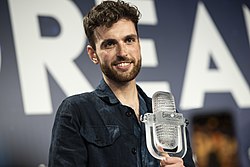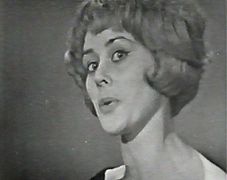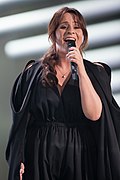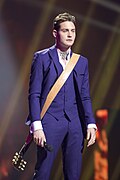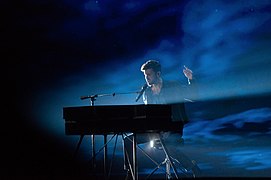Netherlands at the Eurovision Song Contest
- Broadcasting company

- First participation
- 1956
- Number of participations
- 60 (as of 2019)
- Highest ranking
- 1 ( 1957 , 1959 , 1969 , 1975 , 2019 )
- Highest Score
- 498 ( 2019 )
- Lowest Score
- 0 ( 1962 , 1963 )
- Points average (since first post)
- 61.00 (as of 2019)
- Average points per voting country in the 12-point system
- 2.18 (as of 2019)
This article deals with the history of the Netherlands as a participant in the Eurovision Song Contest .
Regularity of participation and successes in competition
The Netherlands took part in the first ESC back in 1956. With the exception of the winner, the results of the year were never announced. In 1957 the Netherlands was immediately successful and was able to win the ESC with Corry Brokken, who had already participated in 1956. The following year she took part again, but this time only came in last with Luxembourg. In the following year, the Netherlands were able to take their second victory with Teddy Scholten and Een beetje . After these initially very successful years, the next few years were less successful.
From 1960 to 1968 the country only achieved placements in the below-average range. During this period, the Netherlands even came in last three times. 1962 and 1963 even with zero points, but the country shared these places with three other countries. The last place in 1968 was also a shared last place. Together with Finland, both got just one point. In 1969 the country was very successful again. Lenny Kuhr won with her song De troubadour . However, this victory was again a shared victory. Finally, France, Spain and the United Kingdom also won in 1969. The 1970s were much more successful for the Netherlands than the 1960s. From 1970 to 1976, with the exception of 1973, the Netherlands only achieved places in the top ten. In 1974 Mouth & MacNeal even took third place, while in 1975 the Teach-In group won the entire competition for the fourth time for the Netherlands. From 1977 to 1979 there were more average placements again.
The rankings fluctuated from 1980 to 1984. In 1980, 1981 and 1983 the Netherlands again achieved two places in the top ten, while in 1982 only 16th place out of 18 participants was achieved. While the country refrained from participating in 1985, when the Netherlands returned in 1986, they only achieved an average place with 13th place. But the rankings continued to fluctuate from here on. In 1987 and 1988 a placement among the top ten was achieved again, but in 1989 and 1990 only 15th place was achieved again. In 1991, the country voluntarily suspended for the second time. From 1992 the fluctuating trend continued. In 1992 and 1993 two places among the top ten were again achieved, while in 1994 the third from last place was only achieved with 23rd place. Because of this placement, the country was then not allowed to participate in 1995. But even after returning in 1996, the placements fluctuated again. In 1996, 1998 and 1999 there were again placements among the top ten, while in 1997 with 22nd place only one place was booked in the lower half of the table.
From 2000 onwards there were no more fluctuating placements. In 2000 and 2001 only average placements were achieved with 13th and 18th place, so that the country was again not allowed to participate in 2003. In 2003 when we returned there was only an average place with 13th place. In 2004, when the semi-finals were introduced, the Netherlands were able to qualify for the final, but only achieved 20th place here. From 2005, the low point in the history of the Netherlands at the ESC followed. From 2005 to 2012, the country always participated, but could never reach the final. In addition, the Netherlands always missed the final quite clearly. In 2011, the country was even completely last in the competition and in the semifinals.
From 2013 the Netherlands became much more successful again. In 2013, when the preliminary round was abolished and Anouk was selected internally, the Netherlands reached the final of the Eurovision Song Contest for the first time in nine years. Here, too, the best placement since 1999 was achieved with 9th place in the final. In 2014, when the Common Linnets were again selected internally, the Netherlands were able to qualify for the final again and even win the semifinals. In the final, second place was the best result since 1975. In addition, the Netherlands got their highest score in the competition with 238 points. While 2015 missed a final for the first time since 2012, the country took eleventh place in 2016 and 2017. In 2018, with 18th place, only an average place was taken. In 2019, the country was able to achieve its first victory in 44 years. After Duncan Laurence was able to win the semifinals, he won the final. It was the Netherlands' fifth win in the competition. With 498 points, the singer also got a new high score for the country in the competition.
In total, 24 of the 60 entries ended up in the left half of the table. In addition, the country has finished last five times so far. In addition, the country missed the final nine times, making it one of the countries that most often failed to qualify for the final. Only Macedonia and Slovenia with ten missed finals each and Switzerland with eleven missed finals failed more often in the semifinals. On the other hand, the country has won the competition five times so far, making it one of the average successful countries in the competition.
List of posts
Color legend: - 1st place. - 2nd place. - 3rd place. - Equal points with last place. - Eliminated in the semifinals / in the qualification / in the Eastern European preliminary decision. - no participation / not qualified. - Cancellation of the Eurovision Song Contest.
| year | Interpreter | Title Music (M) and Text (T) |
language | translation | final | Semi-final / qualification |
National preliminary decision |
||
|---|---|---|---|---|---|---|---|---|---|
| space | Points | space | Points | ||||||
| 1956 | Corry Brokken |
Voorgoed voorbij M / T: Jelle de Vries |
Dutch | Forever over | k. A. / 14 | k. A. | Direct participation | National Song Festival 1956 | |
| Jetty Paerl |
De vogels van Holland M: Cor Lemaire; T: Annie MG Schmidt |
Dutch | The birds of Holland | k. A. / 14 | k. A. | ||||
| 1957 | Corry Brokken |
Net as toen M: Guus Jansen; T: Willy van Hemert |
Dutch | Just like back then | 1 /10 | 31 | National Song Festival 1957 | ||
| 1958 | Corry Brokken |
Heel de wereld M / T: Benny Vreden |
Dutch | The whole world | 9/10 | 1 | National Song Festival 1958 | ||
| 1959 | Teddy Scholten |
Een beetje M: Dick Schallies; T: Willy van Hemert |
Dutch | A little bit | 1 /11 | 21st | National Song Festival 1959 | ||
| 1960 | Rudi Carrell |
Wat een geluk M: Dick Schallies; T: Willy van Hemert |
Dutch | How fortunate | 12/13 | 2 | National Song Festival 1960 | ||
| 1961 | Greetje Kauffeld |
Wat een dag M: Dick Schallies; T: Pieter Goemans |
Dutch | What a day | 10/16 | 6th | internal selection | ||
| 1962 | De Spelbrekers |
Katinka M: Joop Stokkermans; T: Henny Hamhuis, Lodewijk Post |
Dutch | Katinka | 13/16 | 0 | National Song Festival 1962 | ||
| 1963 | Annie Palms |
Een speeldoos M / T: Pieter Goemans |
Dutch | A music box | 13/16 | 0 | National Song Festival 1963 | ||
| 1964 | Anneke Grönloh |
Jij bent my leven M: Ted Powder; T: René de Vos |
Dutch | You are my life | 10/16 | 2 | National Song Festival 1964 | ||
| 1965 | Conny Vandenbos |
't is genoeg M: Johnny Holshuyzen; T: Joke van Soest |
Dutch | It is enough | 11/16 | 5 | National Song Festival 1965 | ||
| 1966 | Milly Scott |
Fernando en Filippo M: Kees de Bruyn; T: Gerrit the Braber |
Dutch | Fernando and Filippo | 15/18 | 2 | National Song Festival 1966 | ||
| 1967 | Thérèse Steinmetz |
Ring-dinge-ding M: Johnny Holshuyzen; T: Gerrit the Braber |
Dutch | Ring-thing-thing | 14/17 | 2 | National Song Festival 1967 | ||
| 1968 | Ronnie Tober |
Tomorrow M: Johnny Holshuyzen; T: Gerrit the Braber |
Dutch | tomorrow | 16/17 | 1 | National Song Festival 1968 | ||
| 1969 | Lenny Kuhr |
De troubadour M: David Hartsema; T: Lenny Kuhr |
Dutch | The troubadour | 1 /16 | 18th | National Song Festival 1969 | ||
| 1970 | Hearts of Soul |
Waterman M / T: Pieter Goemans |
Dutch | Aquarius | 7/12 | 7th | National Song Festival 1970 | ||
| 1971 | Saskia & Serge |
Tijd M: Joop Stokkermans; T: Gerrit the Braber |
Dutch | time | 6/18 | 85 | National Song Festival 1971 | ||
| 1972 | Sandra & Andres |
As' t om deliede gaat M: Dries Holten; T: Hans van Hemert |
Dutch | When it comes to love | 4/18 | 106 | National Song Festival 1972 | ||
| 1973 | Ben Cramer |
De oude muzikant M / T: Pierre Kartner |
Dutch | The old musician | 14/17 | 69 | National Song Festival 1973 | ||
| 1974 | Mouth & MacNeal |
I See a Star M: Hans van Hemert; T: Gerrit the Braber |
English | I see a star | 3/17 | 15th | National Song Festival 1974 | ||
| 1975 | Teach-in |
Ding-a-dong M: Dick Bakker; T: Eddy Ouwens, Will Luikinga |
English | Thing-a-dong | 1 /19 | 152 | National Song Festival 1975 | ||
| 1976 | Sandra Reemer |
The Party's Over M / T: Hans van Hemert |
English | The party is over | 9/18 | 56 | National Song Festival 1976 | ||
| 1977 | Heddy Lester |
De mallemolen M: Frank Affolter; T: Wim Hogenkamp |
Dutch | The carousel | 12/18 | 35 | National Song Festival 1977 | ||
| 1978 | Harmony |
't is OK M: Eddy Ouwens; T: Toon Gispen, Dick Kooiman |
Dutch | It's OK | 13/20 | 37 | National Song Festival 1978 | ||
| 1979 | Xandra |
Colorado M: Rob Bolland; T: Ferdi Bolland, Gerard Cox |
Dutch | Colorado | 12/19 | 51 | National Song Festival 1979 | ||
| 1980 | Maggie MacNeal |
Amsterdam M: Frans Smit, Robert Verwey, Sjoukje Smit-van 't Spijker; T: Alex Alberts |
Dutch | Amsterdam | 5/19 | 93 | internal selection | ||
| 1981 | Linda Williams |
Het is a wonder M: Cees de Wit; T: Bart van de Laar |
Dutch | It's a miracle | 9/20 | 51 | National Song Festival 1981 | ||
| 1982 | Bill van Dijk |
Jij en ik M: Dick Bakker; T: Liselore Gerritsen |
Dutch | You and me | 16/18 | 8th | National Song Festival 1982 | ||
| 1983 | Bernadette |
Sing Me a Song M: Piet Souer; T: Martin Duiser |
Dutch a. | Sing me a song | 7/20 | 66 | National Song Festival 1983 | ||
| 1984 | Maribelle |
Ik hou van jou M / T: Peter van Asten, Richard Debois |
Dutch | I love you | 13/19 | 34 | National Song Festival 1984 | ||
| 1985 | No participation | ||||||||
| 1986 | Frizzle Sizzle |
Everything heeft a ritme M: Peter Schön, Rob Ten Bokum; T: Peter Schön |
Dutch | Everything has a rhythm | 13/20 | 40 | Direct participation | National Song Festival 1986 | |
| 1987 | Marcha |
Rechtop in de wind M / T: Peter Koelewijn |
Dutch | Upright in the wind | 5/22 | 83 | National Song Festival 1987 | ||
| 1988 | Gerard Joling |
Shangri-la M / T: Peter de Wijn |
Dutch | Shangri-la | 9/21 | 70 | National Song Festival 1988 | ||
| 1989 | Justine |
Blijf zoals je bent M: Jan Kisjes; T: Cees Bergman, Geertjan Hessing, Aart Mol, Erwin van Prehn, Elmer Veerhoff |
Dutch | Stay the way you are | 15/22 | 45 | National Song Festival 1989 | ||
| 1990 | Maywood |
Ik wil alles met je delen M / T: Alice May |
Dutch | I want to share everything with you | 15/22 | 25th | National Song Festival 1990 | ||
| 1991 | No participation | ||||||||
| 1992 | Humphrey Campbell |
Wijs me de weg M / T: Edwin Schimscheimer |
Dutch | show me the way | 9/23 | 67 | Direct participation | National Song Festival 1992 | |
| 1993 | Ruth Jacott |
Vrede M: Eric van Tijn, Jochem Fluitsma; T: Henk Westbroek |
Dutch | peace | 6/25 | 92 | National Song Festival 1993 | ||
| 1994 | Willeke Alberti |
What is de zon? M: Edwin Schimscheimer; T: Coot van Doesburgh |
Dutch | Where is the sun? | 23/25 | 4th | Qualified directly for the final | National Song Festival 1994 | |
| 1995 | Not qualified | ||||||||
| 1996 | Maxine & Franklin Brown |
De first keer M: Peter van Asten; T: Piet Souer, Peter van Asten |
Dutch | The first time | 7/23 | 78 | 9/29 | 63 | National Song Festival 1996 |
| 1997 | Mrs. Einstein |
Nobody heeft nog tijd M / T: Ed Hooijmans |
Dutch | Nobody has any more time | 22/25 | 5 | Qualified directly for the final | National Song Festival 1997 | |
| 1998 | Edsilia |
Hemel en aarde M / T: Eric van Tijn, Jochem Fluitsma |
Dutch | Heaven and Earth | 4/25 | 150 | National Song Festival 1998 | ||
| 1999 | Marlayne |
One Good Reason M / T: Tjeerd van Zanen, Alan Michael |
English | A good reason | 8/23 | 71 | National Song Festival 1999 | ||
| 2000 | Linda Wagenmakers |
No Goodbyes M: John O'Hare; T: Ellert Driessen |
English | No "goodbye" | 13/24 | 40 | National Song Festival 2000 | ||
| 2001 | Michelle |
Out on My Own M: Dirk-Jan Vermeij, André Remkes; T: André Remkes |
English | Alone outside | 18/23 | 16 | National Song Festival 2001 | ||
| 2002 | Not qualified | ||||||||
| 2003 | Esther Hart |
One More Night M / T: Tjeerd van Zanen, Alan Michael |
English | One more night | 13/26 | 45 | Qualified directly for the final | National Song Festival 2003 | |
| 2004 | Re-union |
Without You M: Ed van Otterdijk; T: Angeline van Otterdijk |
English | Without you | 20/24 | 11 | 6/23 | 146 | National Song Festival 2004 |
| 2005 | Glennis Grace |
My Impossible Dream M: Robert D. Fisher; T: Bruce Smith |
English | My impossible dream | Eliminated | 15/25 | 53 | National Song Festival 2005 | |
| 2006 | Treble |
Amanbanda M / T: Caroline Hoffman, Niña van Dijk, Djem van Dijk |
Fantasy language , English | Amambanda | Eliminated | 20/23 | 22nd | National Song Festival 2006 | |
| 2007 | Edsilia |
On Top of the World M: Tjeerd Oosterhuis ; T: Martin Gijzemijter, Tjeerd Oosterhuis |
English | At the top of the world | Eliminated | 21/28 | 38 | internal selection | |
| 2008 | Hind |
Your Heart Belongs to Me M: Hind Laroussi Tahiri , Tjeerd van Zanen & Bas van den Heuvel; T: Tahiri & van Zanen |
English | Your heart belongs to me | Eliminated | 15/19 | 29 | internal selection | |
| 2009 | De toppers |
Shine M / T: Bas van den Heuvel & Ger van de Westelaken |
English | Bills | Eliminated | 17/19 | 11 | National Song Festival 2009 | |
| 2010 | Sieneke |
Ik ben ran (Sha-la-lie) M / T: Pierre Kartner |
Dutch | I'm in love (Sha-la-lie) | Eliminated | 14/17 | 29 | National Song Festival 2010 | |
| 2011 | 3JS |
Never Alone M / T: Jaap Kwakman , Jan Dulles , Jaap de Witte |
English | Never alone | Eliminated | 19/19 | 13 | National Song Festival 2011 | |
| 2012 | Joan Franka |
You and Me M: Joan Franka , Jessica Hogeboom; T: Joan Franka |
English | You and me | Eliminated | 15/18 | 35 | National Song Festival 2012 | |
| 2013 | Anouk |
Birds M: Tore Johansson, Martin Gjerstad, Anouk Teeuwe ; T: Anouk Teeuwe |
English | Birds | 9/26 | 114 | 6/16 | 75 | internal selection |
| 2014 | The Common Linnets |
Calm After the Storm M / T: Ilse DeLange , JB Meijers, Rob Crosby, Matthew Crosby, Jake Etheridge |
English | Calm after the storm | 2 / 26th | 238 | 1 /16 | 150 | internal selection |
| 2015 | Trijntje Oosterhuis |
Walk Along M: Tobias Karlsson; T: Anouk Teeuwe |
English | Go along | Eliminated | 14/16 |
33 | internal selection | |
| 2016 | Douwe Bob |
Slow Down M: Douwe Bob Posthuma , Jan-Peter Hoekstra, Jeroen Overman, Matthijs van Duijvenbode; T: Douwe Bob Posthuma , Jan-Peter Hoekstra, Jeroen Overman |
English | Slow down | 11/26 | 153 | 5/18 | 197 | internal selection |
| 2017 | O'G3NE |
Lights and Shadows M: Rick Vol, Rory de Kievit; T: Rick Vol |
English | Lights and shadows | 11/26 | 150 | 4/18 | 200 | internal selection |
| 2018 | Waylon |
Outlaw in 'Em M / T: Waylon , Jim Beaver, Ilya Toshinskiy |
English | Lawlessness in itself | 18/26 | 121 | 7/18 | 174 | internal selection |
| 2019 | Duncan Laurence |
Arcade M / T: Duncan Laurence , Joel Sjöö, Wouter Hardy |
English | Game Room | 1 / 26th | 498 | 1 /18 | 280 | internal selection |
|
|
Jeangu Macrooy |
Grow M: Jeangu Macrooy , Perquisite; T: Jeangu Macrooy |
English | To grow |
Cancellation due to the COVID-19 pandemic by the EBU |
internal selection | |||
| 2021 | Jeangu Macrooy | Qualified directly for the final |
internal selection
|
||||||
National preliminary decisions
Until 2012, the Netherlands held regular preliminary rounds, mostly under the title Nationaal Songfestival . Until then, only the artist and the corresponding song were selected internally in 1961, 1980 and 2008. However, since 2013 all Dutch contributions have been selected internally. The preliminary round, which took place regularly until 2012, was carried out in many different systems:
Classic preliminary decision
In most cases, a “classic” preliminary decision took place, that is, several artists presented several titles in one evening, from which the favorite was selected at the end. The system was implemented in the years 1956 to 1958, 1962, 1968 and 1969, 1976 to 1978, 1981, 1983 to 1986, 1989, 1992 and 1998 to 2001, with slight differences: as a rule, each singer introduced a song, but especially in the early years, some performers had several songs in a preliminary round. In 2006 three artists each offered three songs to choose from. The number of songs presented varies between 4 and 13.
In 2010 the system was changed slightly. The song was produced in-house by Pierre Kartner . After that, the song was sung by five artists in five different versions. Then a four-person jury awarded one vote for the best song. The studio audience gave another vote. Since there was a tie between two artists, Pierre Kartner decided who won the preliminary round.
Preliminary decision with a singer
For some preliminary decisions, the artist or group was selected internally, who then presented several titles. This was the case in 1963 and 1964 (three titles each), 1967 (six titles), 1971 to 1974 (between three and six titles), 1987 and 1988 (six titles each), 1992 to 1994 (eight titles each), 1997 ( again six titles) and 2011 (five titles). 2007 is particularly out of the ordinary, Edisilia Rombley presented three songs, but in the end she chose her own song for Helsinki, even if a jury was at her side to advise her.
Preliminary rounds with preliminary rounds
Occasionally, semi-finals were held before the final: in 1965 five preliminary rounds with three titles each, in 1990 two semi-finals with 10 titles each and from 2003 to 2005 four each. In 1996 there were also five preliminary rounds, but they differed in that only one artist or group presented three titles in each round, of which the best qualified for the final.
Preliminary decisions with separate choices
In 1975 and 1982 the singer and song were chosen independently. Three performers each presented the same three titles from which the favorite was chosen. Then the song was presented again by all three before the Dutch representative was chosen.
Voting modes
In most years, a jury was selected for the preliminary round, which was composed differently and partly received music experts, singers or, as in 1977, only celebrities or “normal” citizens recruited. In 1978 a jury unit consisted entirely of former Dutch participants in the competition. In a few years the jury was expanded by a telephone vote, as it was done in 1959 and 1960 and in all years from 1996. 1956 to 1958 and 1971 the audience was allowed to vote alone, namely by sending in postcards.
Broadcasting company
In 2009, the previously responsible broadcasting company NOS announced that responsibility for the contributions to the ESC would be transferred to another institution within the NPO , the TROS . This merged with the broadcasting corporation AVRO to AVROTROS in 2014 , which is now also responsible for the Eurovision Song Contest.
Commercial success
The three Dutch winning titles in the 1950s and 1960s were only minor successes internationally. Only Een beetje reached 13th place in Italy in the Italian version. Ding-a-dong , the winning title from 1975, sold better in comparison, but was not a hit parade either. In contrast, Als' t om deliede gaat , number 4 at ESC in 1972, was relatively successful and reached the charts in some countries.
After 1975 there were not only further victories or top 3 placements at the ESC for Dutch titles, but also notable chart successes for many years. Only in 2013, after number 9 at the ESC, Anouk also reached number 3 in the Dutch and number 49 in the German single charts. A year later, the Common Linnets achieved second place with Calm After the Storm, not only the greatest success at the ESC for almost 40 years, but also the greatest commercial success of all Dutch ESC contributions. The title was number 1 in the charts in Belgium, number 2 in Denmark, Austria and the Netherlands itself and number 3 in Germany and Switzerland. Also in Ireland, Spain and Great Britain the leap into the top 10 succeeded, in other countries the placement in the charts.
languages
In the years with no language regulation, the Netherlands usually had their contributions sung in English, exceptions are De oude muzikant 1973 and Ik ben ran (Sha-La-Lie) 2010. 1983 was the title line of Sing Me a Song as well as several others Words in the text in English , but the scope was still within the limit approved by the EBU. In 2006 the refrain was performed by Amambanda in an imaginary language. Many of the contributions sung in Dutch at the competition have also been published in English, including all the songs since 1968. Many other contributions were also recorded in German, some in Italian , Spanish and other languages.
Competitions held
Scoring
The following countries received the most points from or awarded the most points to the Netherlands (as of 2019):
|
|
|
|
||||||||||||||||||||||||||||||||||||||||||||||||||||||||||||||||||||||||||||||||||||
Award of the highest rating
Since the introduction of the twelve-point system in 1975, the Netherlands has awarded the maximum number of points to 20 different countries, six of them to Turkey. In the semifinals, the Netherlands awarded the highest number of points to eleven different countries, four of which went to Armenia and Sweden.
|
|
|||||||||||||||||||||||||||||||||||||||||||||||||||||||||||||||||||||||||||||||||||||||||||||||||||||||||||||||||||||||||||||||||||||||||||||||||||||||||||||||||||||||||||||||||||||||||||||||||||||||||||||||||||
Trivia
- In 1958, the Netherlands, as last year's winner and host, came in last - albeit shared. It was not until 2015 that Austria, the second country, succeeded in doing this.
- In 1976 Corry Brokken hosted the Eurovision Song Contest from The Hague. She was the first former participant to take on this task. In addition, she is the only singer who took both first (1957) and last (1958).
- Due to the explosion of the fireworks factory in Enschede on May 13, 2000, televoting in the Netherlands was dispensed with at the ESC that took place that evening and the voting of a jury was used.
- In the competitions that were held in the Netherlands, the scoreboard was often written in Dutch . In 1980 it was labeled in English, but the presenter spoke Dutch while calling the juries in the other countries on various phones.
- For the Eurovision Song Contest 2011 in Düsseldorf , the delegation headed by the 3JS band traveled to a river cruise ship that was moored on the banks of the Rhine near the old town .
- The Netherlands was the first country to win the ESC twice.
- By canceling the Eurovision Song Contest 2020, Duncan Laurence is the longest reigning ESC winner of all time. A new winner will not be determined until 2021.
Impressions
literature
- Jan Feddersen: A song can be a bridge . Hoffmann and Campe, 2002
Web links
Individual evidence
- ↑ Agnes Katharina Sieland: ESC: Netherlands not in the final. In: NetherlandsNet. Center for Dutch Studies, University of Münster , May 13, 2011, accessed on May 18, 2013 . In 2012 the Netherlands could not qualify either.
- ↑ Chart statistics for Calm after The Storm on acharts.us
- ↑ diggiloo.net
- ↑ diggiloo.net
- ^ NDR: All information about the ESC 2021 in the Netherlands. Retrieved June 22, 2020 .



